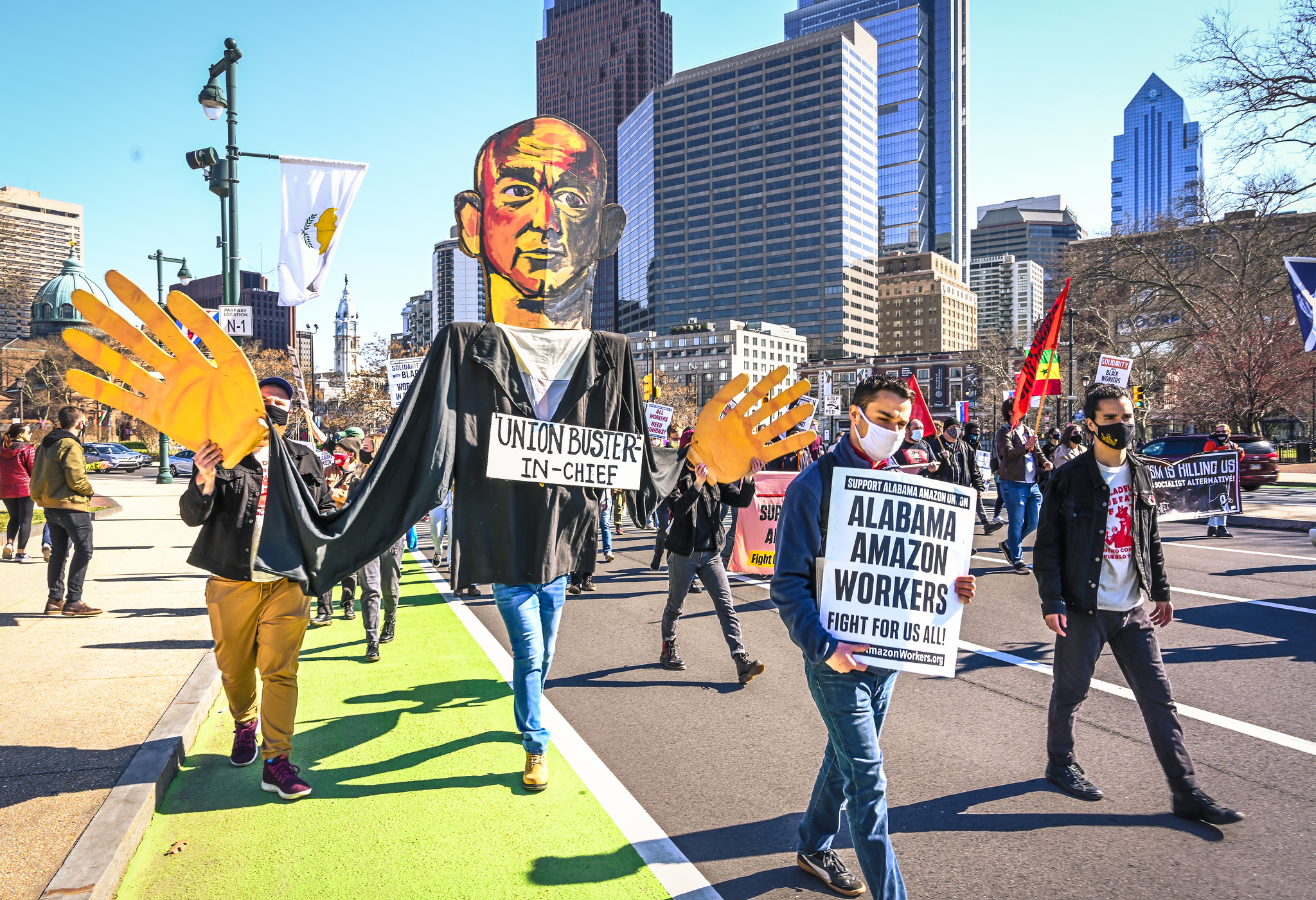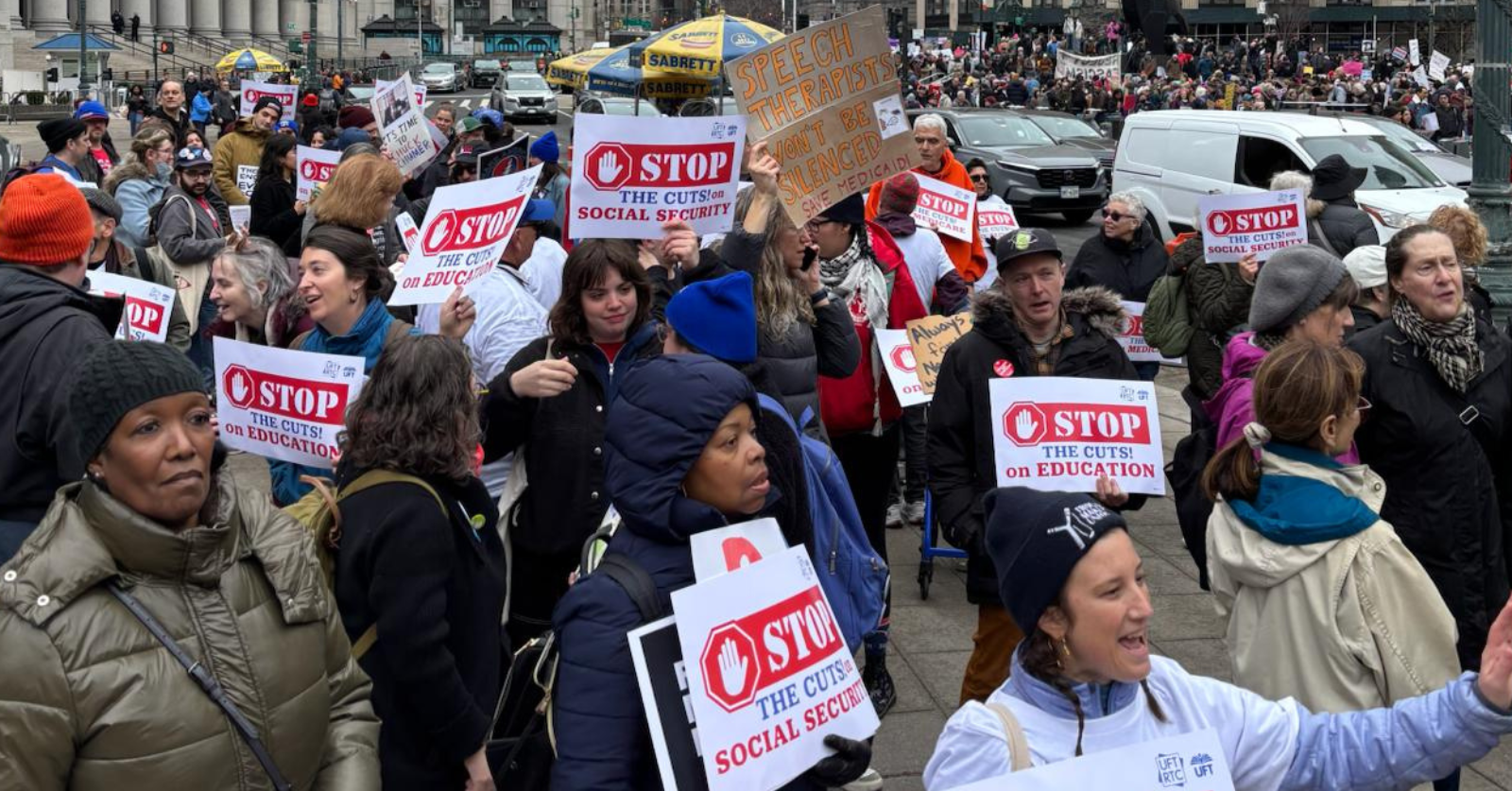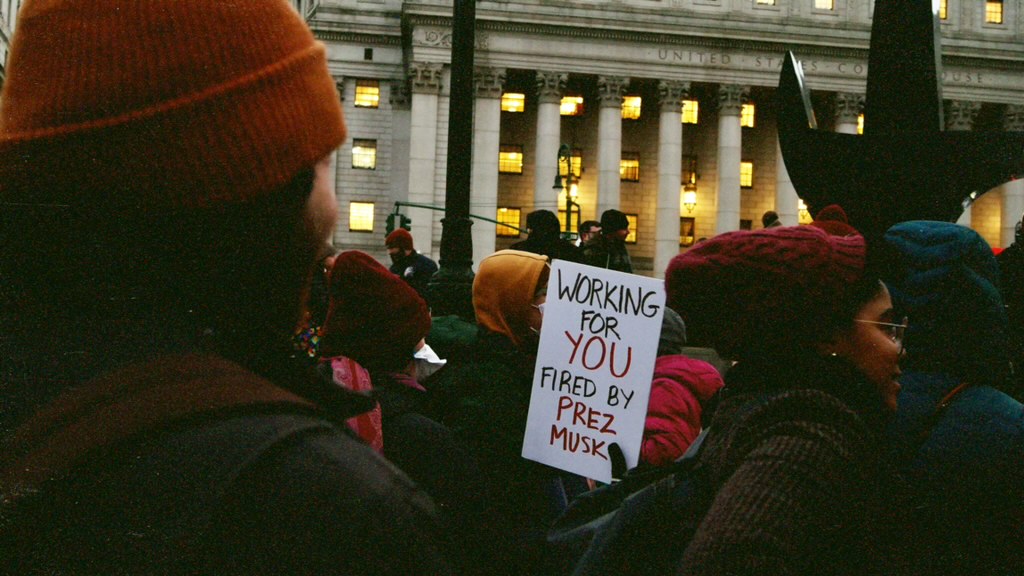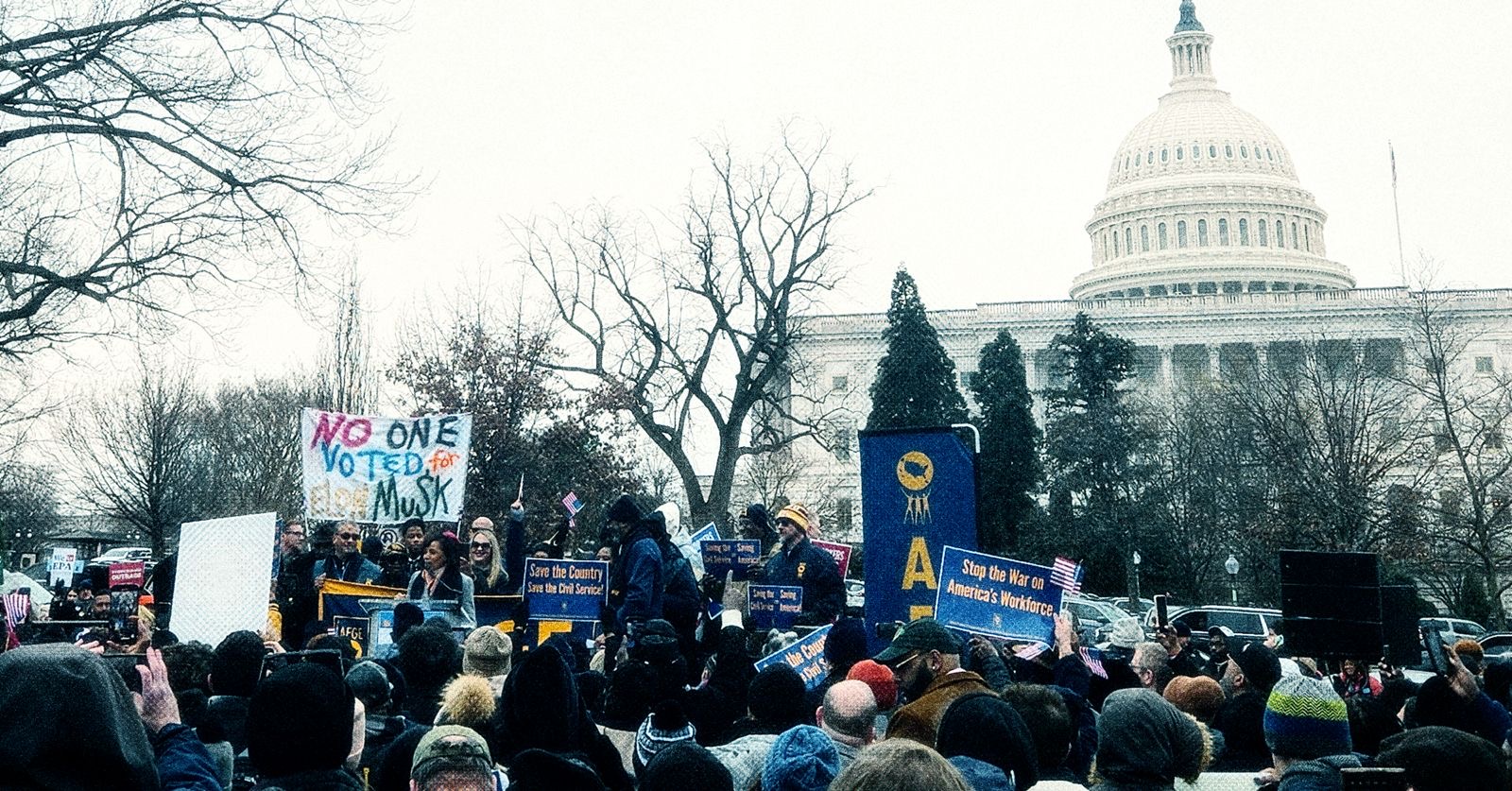The vote in Bessemer was upsetting. In the past year, consummate ghoul Jeff Bezos made tens of billions of dollars off the pandemic-induced, state-sanctioned suffering faced by millions of ordinary people, and nothing would have felt better than to see him and his rapacious logistics empire eat shit at the hands of workers he thought were so docile their warehouse didn’t even register on Amazon’s panopticon-style “potential hot shop” algorithm.
Since this brutal if not entirely unexpected loss, the usual outlets have erupted in a symphony of takes. I can’t pretend to meaningfully assess what exactly went wrong, and besides, others have already done so in depth. But as part of RWDSU’s uniquely open campaign, I was able to participate in this historic unionization effort by phonebanking Amazon workers in Bessemer, and I can share what some of these workers had to say about why they were fighting — against all odds — for a brighter future
* * *
It’s important to remember that Amazon isn’t a regular boss. It’s a colossus, a Goliath’s Goliath here to do one thing: make money by cutting labor costs. Amazon doesn’t just want to defeat organizing efforts — it wants to drive them into the ground like a tent peg. By now, we’ve already heard many of the disgusting details. Amazon more than doubled the bargaining unit size by conducting the single largest mass hiring frenzy in the company’s history; illegally installed a private USPS mailbox right outside the warehouse as voting began; changed local traffic light patterns; offered job buyouts; etc.
But the company’s everyday union-busting tactics on the shop floor were as grotesque as their more headline-grabbing maneuvers. One worker told me their manager walked around with two boxes of buttons — one that said “I voted” and another that said “No.” (“Yes” buttons were of course absent.) The manager would ask people if they wanted an “I voted” button and, if they said yes, would then ask if they wanted a “No” button. If they said yes to the former but no to the latter, the manager would make a cartoonishly conspicuous note on a massive clipboard.
Constant anti-labor, “captive audience” meetings were an annoyance and a condescension mentioned by almost everyone I talked to. “They had us going to the meetings too much, 3-4 times a week,” one woman said; “always something bad about the union.” One young man told me he was originally leaning toward voting no, but the supreme smugness of Amazon’s “fancy, out-of-town lawyer” was so enraging it made him reconsider. “This man came in from out of town and was just using all these big words to try and make us feel dumb and confused. And I really didn’t appreciate that, so I ended up doing my own research.”
Indeed, many workers rightly read Amazon’s snobbish torrents of legalese as yet another expression of the company’s generalized contempt toward its workers. “How stupid do they think we are?” one woman asked. Another man basically shouted down the phone, “Why is Amazon fighting this if they take such good care of their workers? Make it make sense! If everything’s so good, why are they fighting it so hard?”
These anti-labor tactics are just a few drops in the fetid bucket of disinformation Amazon used to douse even the faintest spark of shop-floor insurgency. Speaking to a heightened HR presence, one man said the atmosphere at work throughout the election was like “a circus.” “If it’s bad now when they’re supposed to be on their best behavior, imagine how it’ll be later!” Another worker similarly noted that HR never walked around the warehouse before, but with the election coming up they were doing it all the time. “Now I’m starting to see the whole picture,” she said; “they only want to act like they’re gonna change because the union is there.” Many workers saw this sham behavior for what it was: “They’re making these really big threats,” one woman told me, “but they’re trying to make it sound mild.”
In spite of these threats, at least two women felt a taste of their own power at these anti-labor meetings. “I asked the man, ‘If the union’s so bad for us, what exactly are you doing here?’ That shut him up pretty quickly.” “When they have meetings with us,” another woman gleefully reported, “they tell us so many negative bad things about the union. But I asked a guy, ‘Why is the union here, and what is the cause of all this to make the union be here?’ And he ended the meeting!”
It makes sense these women enjoyed striking back at the boss. Amazon’s Bessemer workforce is around 85% black and majority women, but casual gender and race discrimination are endemic. For instance, the women’s bathroom is farther away than the men’s, which effectively means women are forced to have shorter bathroom breaks.
Plus, despite the degrading daily ritual of walking through two metal detectors to make sure they’re not “stealing” anything, workers are only allowed to have clear bags in the warehouse. One woman told me she was ashamed to bring her breastfeeding accessories to work. Another said she and her co-workers were embarrassed to pack their menstruation products, something Amazon apparently tried to get around by intermittently stocking bathrooms with the world’s worst tampons. “I feel like they should respect women’s personal issues,” one woman told me; “we don’t want to use those rough, hard tampons they provide!”
Likewise, despite its public posture as an employer that cares about racial justice, the company offers few opportunities for advancement for its majority black workforce in Bessemer. One woman in particular, who was trying to advance to the position of “training ambassador,” did a ton of extra work with no extra pay for months — meanwhile newer, often white people with bachelor’s and master’s degrees would get all the positions that carried a pay raise.
She said recently she’d given up on trying to be a training ambassador and had been having a hard time going to work and just wanted to stay in bed; “It’s so boring, it just feels like it’s impossible to advance.” She said the union drive was the most animated she’d felt in a long time. “I’ve been through hell and high water for Amazon,” she said, before signing up to go to an organizing meeting.
While bathroom break issues loom large in our understanding of Amazon workers’ abject working conditions, the vast majority of complaints I heard stemmed less from gross injustices and more from the aggregate of small incompetencies and indignities faced daily by workers. One man told me he was marked late when it was his managers who clocked him in at the wrong time; “You can get fired for one of their mistakes!” Another woman told me workers are allowed to use their cell phones for a work app, but managers will give people write-ups before seeing whether people are using their phones for work or not.
Multiple people complained about taking leaves of absence for COVID, yet once they were well in the clear of the illness management continued extending their leaves for sometimes months at a time, leaving them in the lurch financially. For one woman I spoke to, Amazon’s incompetence had devastating repercussions. The company was 4-5 weeks late on her paycheck, and in that time she got her car towed with no way of paying to get it back. “I lost everything I had,” she said.
In spite of all this, not everyone was pro-union. (Although most people I spoke to were. The final margin, 1798-738 against unionization, did not reflect my anecdotal experience.) One woman’s “no” vote seemed motivated largely by racial animus. If the workforce is 85% black, the union will be for “them” and not for “us,” she said, while complaining about having to listen to “the BET.” Another woman said the union “talked down” to her.
A handful of curt responses went something like this: “This is a good job and it pays well. If you work hard, there shouldn’t be any problems.” Or, “Everything is fine. It’s a job.” Several people seemed to resent having to have an opinion on the matter at all: “If it happens, I’m good with it, if not, I’m good with it either way”; or, “I’m with whatever people say.”
Another man understood the power of collective action, yet remained noncommittal. “I’m from New York,” he said, “and I’ve seen the good side and the bad side of having a union — workers have to be united to make it happen.” When I asked him what was holding him back, he revealed he’d been through the process of voting for a union before: the workers lost, and the company fired about 150 people, including him. Before hanging up, he referred to himself as the “sacrificial lamb.”
* * *
With a company as monstrously powerful and morally bankrupt as Amazon, it’s gratifying to focus on the most heinous injustices as the grounds for organizing. But the courageous workers in Bessemer show that mundane indignities and unending monotony doled out daily by petty tyrants can grind away at what makes us human as much as the grossest of workplace inequities — and that these indignities are enough to make a few hundred of the powerless suddenly take on the sadistic, crushing machinery of the powerful.
These were ordinary working people taking on an extraordinary fight. But if it can happen in Bessemer, it can happen anywhere. The conditions that made these workers fight back aren’t going away, and there will continue to be people who want the powerful to feel viscerally what it means to have power wielded against them. We need to join their ranks and amplify their activity and organization if we want to lob more than symbolic volleys against our class enemies.
Amazon apparently spent around $25 million to defeat a single unionization drive in a small suburb in the south. The capitalists know that logistics is far too important a battlefield to give up in the class war — do we?




